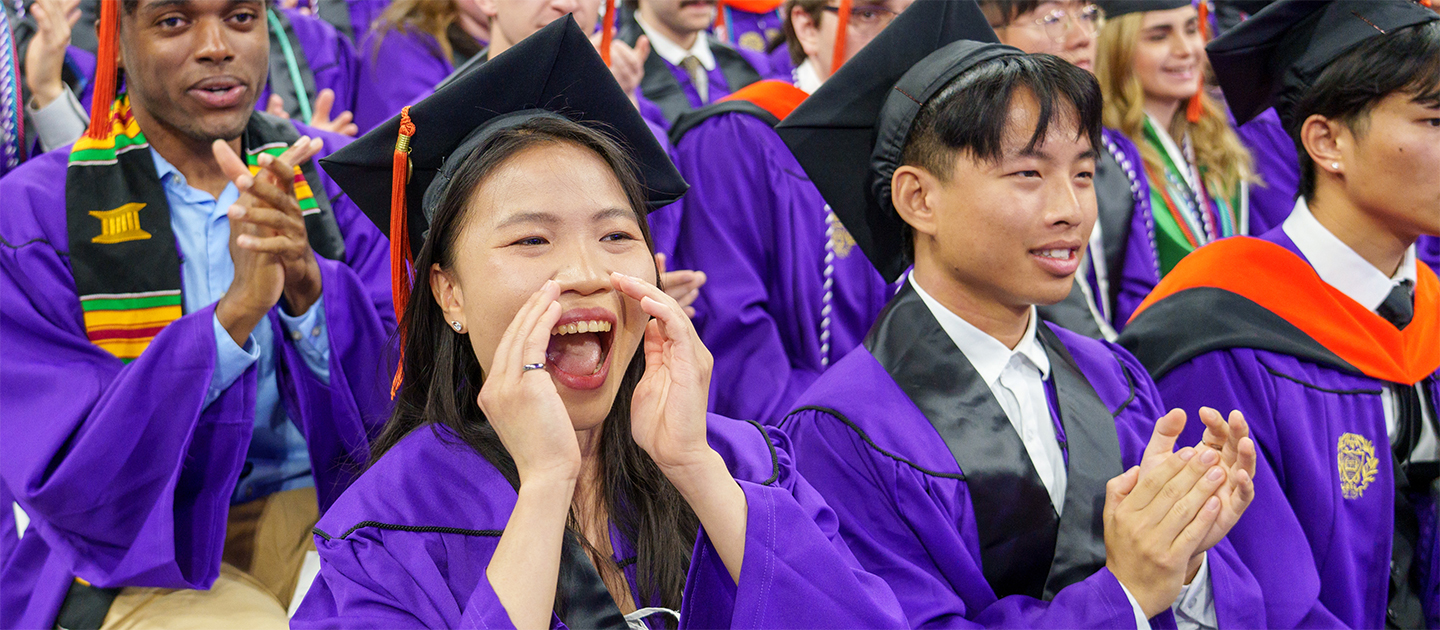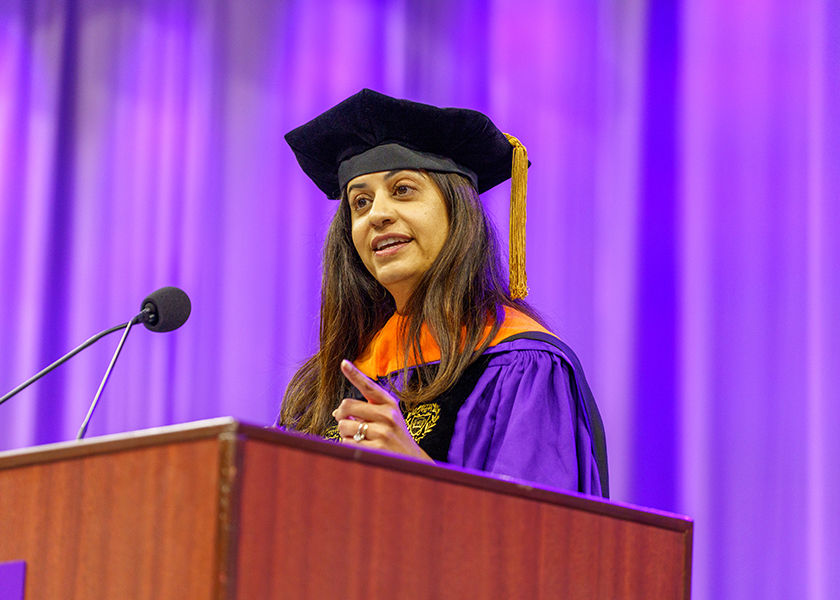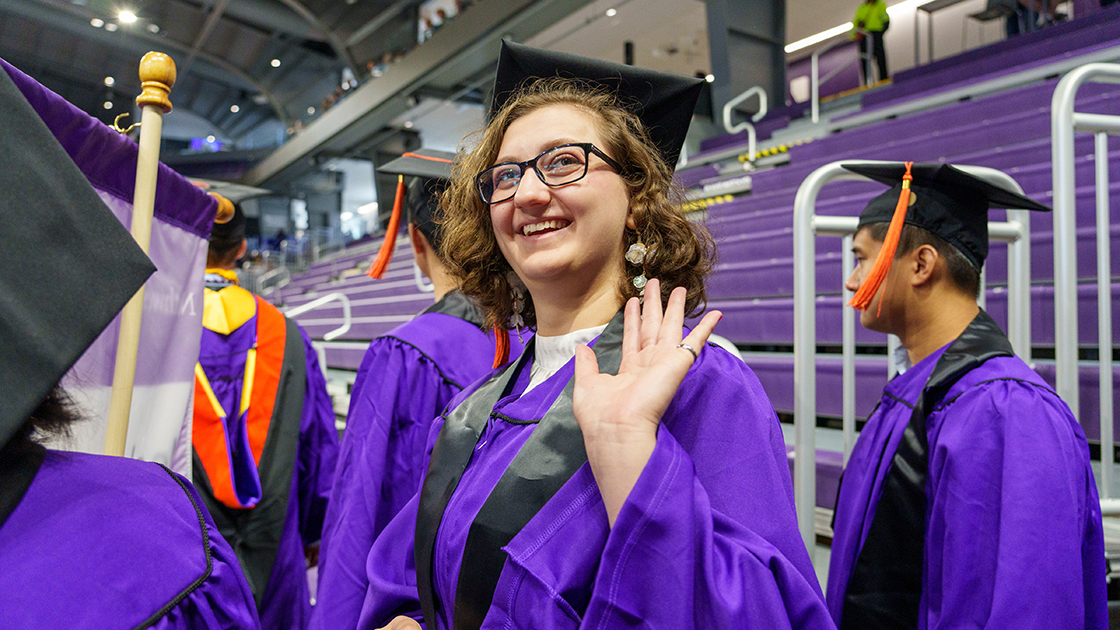Sheila Gujrathi Tells Her Story to Graduating Seniors
Gujrathi and Dean Christopher Schuh spoke at the 2024 Undergraduate Convocation on June 10

Like the graduating engineering students listening to her speak, Sheila Gujrathi (’92, MD ’96) was forced to deal with a significant challenge at the outset of her Northwestern journey. While the class of 2024 had to scale the significant obstacles that the COVID-19 pandemic caused, Gujrathi lost her father just before her first year on campus.
Gujrathi savored her newfound independence and exploring the biomedical engineering curriculum at Northwestern Engineering, but she was also struggling with her new reality and how to move forward. Eventually, the significant toll led Gujrathi to make a risky choice.
“By the time I was in my first year of medical school, everything came crashing down on me like an avalanche: The unprocessed grief. The expectations. The pressure. I couldn’t figure out how I’d gotten here — or why I was doing any of it at all,” Gujrathi said. “So, I did something that shocked everyone, most of all myself: I left. I sublet my apartment and moved to an ashram in India. While my classmates were in their clinical rotations, I was meditating in a jungle.”
Gujrathi told that story during her address at Northwestern Engineering’s 2024 Undergraduate Convocation held June 10 at Welsh-Ryan Arena, part of the University’s 166th Commencement. A biotechnology entrepreneur and executive, healthcare investor, and drug developer with more than 25 years of experience in the biotech and pharmaceutical industries, Gujrathi was introduced by Dean Christopher Schuh.

“Engineering is hard. Sometimes you're going to get it wrong. But you showed us that you are resilient and can learn from failures. It’s only a failure if you don’t learn from it, right?” Schuh told graduates. “Continue to play to your strengths but also take risks, be both creative and curious. You will build a rewarding and fulfilling life for yourself.
“There really is no limit to what you can do.”
Gujrathi is proof of that.
Her detour to the ashram — which Gujrathi’s mother eventually approved of — had a profound impact on her life. It helped her define her purpose and values and let Gujrathi hear her inner voice for the first time.
View photos from Undergraduate Convocation >>
Gujrathi did return to Northwestern to finish her medical degree, but instead of becoming a career practicing physician, she went on a different path — founding, building, and running numerous biotech companies and leading the development and approval of multiple life-changing pharmaceutical drugs for patients with immunology and oncology diseases.
“Don’t ignore the answers. They’re pointing you to your purpose and passion: what you were put on this earth to do,” Gujrathi said. “You can’t become a master and excel in your career, go the extra mile, and overcome the countless professional challenges that will inevitably come your way unless you figure that out and simply love what you do. You can’t stop at what you want to do, though — you also need to figure out who you want to be.”
As Gujrathi stressed, that makes it crucial to live a life congruent with your own values.
When Gujrathi started her business career, she recalled that people kept telling her to perfect a poker face. But Gujrathi prioritized honesty and openness and learned that not everybody is suited to wear a poker face, and that is not a hindrance to success.
It has not been for Gujrathi, the cofounder and former CEO of Gossamer Bio. Prior to Gossamer Bio, she served as chief medical officer of Receptos, which was acquired by Celgene. Before that, she was vice president of the global clinical development group in immunology at Bristol Myers Squibb, and held multiple roles in immunology and oncology at Genentech.
“You should be able to live an integrated life, where you are the same person professionally and personally. The fact is, the wider the gap between the ‘work you’ and the ‘real you,’ the harder it is to feel safe and secure. It’s exhausting to maintain a facade that is not your truth,” she said. “Don’t compromise yourself and settle for less. When you eliminate that gap, you will not only find it easier to live with yourself but to achieve so many of your aspirations. Your power and courage come from your authenticity, and that is when you thrive.”
Having a strong support system is also a plus.
Throughout her career, Gujrathi said she has been in countless rooms where she was the only woman, let alone the only person of color. She had been told numerous times she would never get the job she wanted, that she was too ambitious, and it was doubtful she would succeed.
Gujrathi persevered, but those words hurt. Luckily, she had a mentor who asked her why she wasn’t pursuing CEO roles. That confidence boosted Gujrathi, and she’s tried to pay it forward by creating a group for women biotech CEOs that’s become a “true sisterhood.”
“It doesn’t matter whether you’re entry-level or in the C-Suite, building a company from scratch, or picking yourself up from the failures that you will undoubtedly experience along the way, none of us can navigate the world alone,” Gujrathi said. “So don’t try. Build a brain- and heart-trust you can turn to guide you along your journey.”





